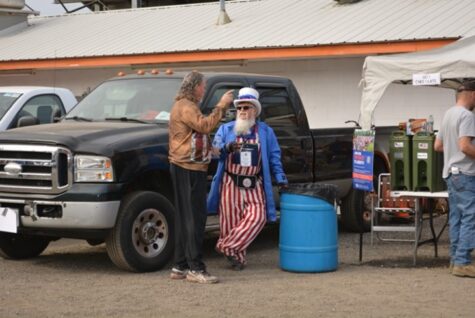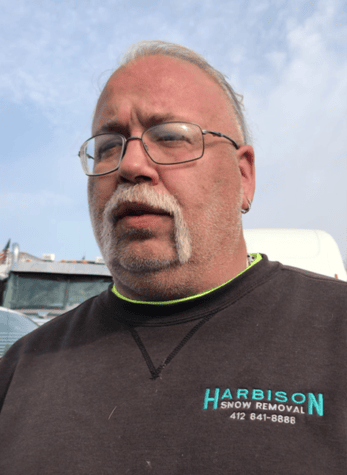The deafening roar of truck horns and smell of diesel fumes filled the air as more 18-wheelers entered the already packed Hagerstown Speedway. A sea of semi-trucks, pickups and cars stretched as far as the eye could see on the gravel lot and narrow entrance road dotted with rural landmarks: small homes and trailer parks, plots of farmland and the occasional mom-and-pop shop.
People of all ages came, including many families with young children—all were showing their support for the cause. Many flaunted patriotic shirts and hoodies, MAGA hats and American flags that trail behind them on poles or lie draped around them as capes. Some were Maryland natives, and others were from across the U.S.
This was The People’s Convoy, also referred to as the Freedom Convoy or Trucker’s Convoy. This 8-mile-long army of several dozen tractor-trailers, pickup trucks, cars and motorcycles traveled 2,600 miles from Adelanto, Calif. to Washington, D.C., to protest vaccine mandates and Covid restrictions in the U.S.
“I’m here to end the emergency mandate,” said Mike Harbison, owner and operator of Harbison Trucking in McMurray, Pa. “We’ve been pushed against the wall too much, and you can only push so far — and we’re pushing back. We the people want to take our country back; we want to let the politicians know that they work for us.”
Before their last procession, a 130-mile trip twice around the Capital Beltway that took place on March 7, the group congregated in Hagerstown, Md. to kick off their home stretch.

Photo by Ethan Baker
The official Facebook group for the convoy that documents its latest happenings, administrated by Kris Young and five others, has gained over 315,000 members since Jan. 31 of this year and still continues to grow.
According to the New York Times, even as many states have scaled back their Covid restrictions due to a steady decline in cases and fatalities, members of the People’s Convoy still call for

Photo by Ethan Baker
an end to all remaining coronavirus-related restrictions and an end to the national emergency declared by former President Donald Trump in March 2020 and extended by President Biden.
Many protestors also expressed the need for meetings with lawmakers and congressional hearings on the pandemic’s origin and have demanded an end to vaccine and mask mandates.

Photo by Ethan Baker
This comes at a time when The Centers for Disease Control and Prevention is continuing their push for an increased vaccination rate and an upholding of vaccine mandates in many instances to prevent the spread of Covid, which is still a threat despite the lower numbers and loosening of regulations. At the same time, they also issued new guidance saying that many Americans could stop wearing masks, prompting many cities, school districts and universities to change their guidelines.
“We’ve seen that movie before,” said Dr. Shweta Bansal, an infectious disease ecologist at Georgetown University in a Vox interview, responding to the removal of these preventive measures. “The virus has a way of roaring back. We really should be taking advantage of this hiatus to build up our preparedness capacity.”
Likewise, the public’s reaction to Covid policies of prevention is a key determinant in the future of the pandemic. We’ve “learned a ton in terms of behavior, and how people tend to react to policies of controlling viruses,” said Bansal.
Certainly, at the far end of the spectrum of public reaction to government regulation and mandates regarding the Coronavirus are The People’s Convoy, whose members call for a complete stop to them.

Photo by Ethan Baker
Mike Harbison refers to himself as a jack of all trades—he makes a living as a truck driver, mechanic and welder. According to him, he made a good amount of money too—at least, before the pandemic hit. He blames the recent downturn in business on both the rising gas prices and lack of supplies to haul from distributors.
“Ever since the mandates my business has dropped severely,” said Harbison. “I’ve gone from working 60 hours a week down to eight hours a week. With everything that they’ve [the government] done with COVID-19 and the manufacturer shortage, the companies I haul building materials for have had jobs put on hold by the customers—so they’re even suffering.”
This period of economic stagnation still stubbornly persists today just as the virus itself lingers in 2022. According to a survey by Goldman Sachs, nearly three-quarters of U.S. small business owners said the recent rise in Covid-19 cases has negatively affected their revenue.
On top of that, in a recent article by management consulting firm McKinsey & Company, consumer-packaged-goods companies are under more pressure than ever, with prices for food and packaging increasing by more than 22 percent as well as manufacturing and labor costs.
“We have a lot of customers that require a mask and health screening,” said trucker Niels Mortensen. “They’ll take your temperature; no one’s asked me for my card yet, so that’s a good thing. The average American is shamed by their peers for not getting the vaccine or even questioning it, and it’s just ridiculous.”
Mortensen is vaccinated, though he did it more so for his job than the health benefits.
“I got it [the vaccine] under protest,” said Mortensen. “I did it to prevent being discriminated against, truthfully. I had to. Professional people have been drummed out of their profession and it’s just gone too far. The government should never mandate a medical procedure, nor should employers.”
While the CDC makes the reasons to get vaccinated clear, namely its ability to lower one’s risk for getting and spreading the virus, vaccine hesitancy and refusal is still high, with around 30% of U.S. adults remaining unvaccinated, according to Forbes.
While over 950,000 people have died from Covid-19 in the United States alone, many feel that the government should not require them to get vaccinated and that it should remain a personal choice. Likewise, according to The Guardian, many regard their medical choices as private and believe they should not have to “disclose them to participate in everyday activities.”
March 2022 marks a grim milestone — two years since the nationwide lockdown first began.
While there’s no telling what the future of Covid holds or what new variant might arise in the future, “societies must be prepared to respond if and when that happens…[and] leaders should think about ways to expand opportunities,” according to McKinsey & Company.
In the case of many of these truckers, in particular, the future remains uncertain.

Leave a Reply